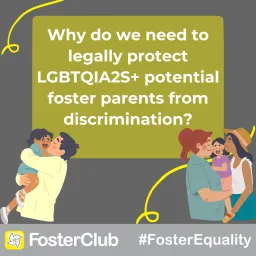LGBTQIA2S+ youth in foster care experience higher rates of discrimination in the child welfare system, as opposed to their heterosexual peers, due in part to potential families' unwillingness to foster young people because of their sexual orientation or gender identity1. One way to help reduce discrimination against queer youth in care is to recruit and maintain foster parents who identify as part of the LGBTQIA2S+ community.
To help recruit foster parents, FosterClub created Discover Foster Parenting–which centers the voices of young adults, birth parents, and foster/resource parents, all who have lived experience with the child welfare system–to educate potential foster parents on what foster parenting is really like.
How would LGBTQIA2S+ foster parents help LGBTQIA2S+ youth in care?
While all families are able to provide affirming homes for LGBTQIA2S+ youth in care, queer foster parents provide additional support by understanding the unique experiences that come with growing up queer. For LGBTQIA2S+ youth, having a safe and affirming space to live would mean:
Less entrances into congregate/residential care
Less experiences of harassment in foster homes
Increased permanency rates
Less chances of running away2
Which in turn means a reduced risk of homelessness or being sex-trafficked3
So why aren’t there more LGBTQIA2S+ adults fostering LGBTQIA2S+ youth in care? While LGBTQIA2S+ adults are seven times more likely to foster and/or adopt than straight and cisgendered adults4, agencies often discriminate against queer adults–making it hard or impossible for them to foster and/or adopt.
How can agencies legally discriminate against potential queer foster parents?
There is no legal federal protection against discrimination for potential queer foster parents
The Every Child Deserves a Family Act was introduced during the 117th Congress to protect against discrimination. However, it never made it to a vote
The Supreme Court ruling in Fulton v Philadelphia provided a religious exemption for agencies contracting with government entities to discriminate against potential foster parents on the basis of their sexual identity or sexual orientation
Read the Amicus Brief from FosterClub on Fulton v Philadelphia here
While some state statutes, regulations, and/or agency policies prohibit discrimination against foster parents on their sexual orientation and/or gender identity, which state a LGBTQIA2S+ youth in care resides in or what agency handles their case should not impact if they have access to loving and affirming LGBTQIA2S+ foster parents.
What can you do?
Caseworkers + advocates + professionals: Encourage your agency to create and adopt policies that prohibit the discrimination of LGBTQIA2S+ foster and adoptive families.
Kinship Caregivers + foster/resource families: Work to create and maintain an inclusive and affirming space for LGBTQIA2S+ youth in your care.
Everyone: Contact your representatives and senators! Urge them to pass laws that protect LGBTQIA2S+ foster parents from discrimination.
Additional Resources:
Child Welfare (Includes Resources on Recruiting and Supporting LGBTQ+ Families)
The National Foster Parent Association’s Committee on LGBTQ+ Families and Youth
Sources:
1LGBTQ Kids have a Harder Time Finding Permanent Homes
2How can Child Welfare Agencies Effectively Support LGBTQ+ Youth in Care?

